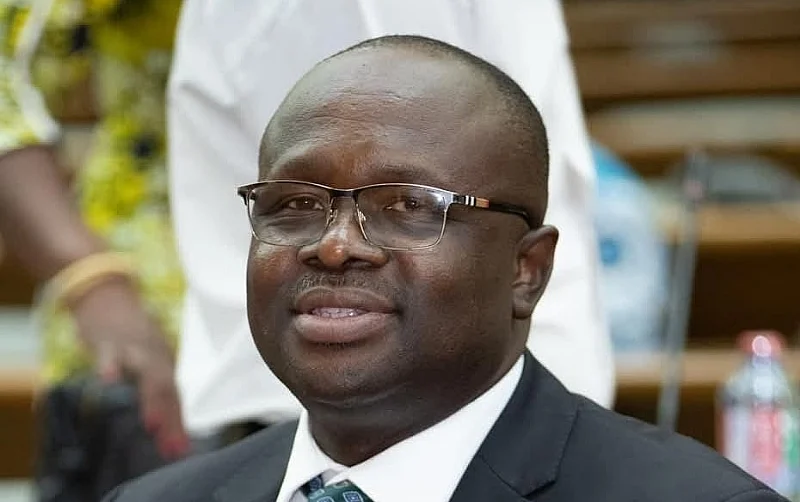Edward Kofi Omane Boamah: Profile of Ghana’s defence minister who died in helicopter crash

Dr. Edward Omane Boamah: From medicine to national defence, a visionary leader lost too soon.
Dr. Edward Kofi Omane Boamah, Ghana’s Minister for Defence at the time of his untimely death in a helicopter crash in the Ashanti Region, was a man whose life journey intertwined the fields of medicine, technology, politics, and public service. From the lecture halls of the University of Ghana Medical School to the highest levels of government policy and national security, Dr. Omane Boamah exemplified a rare blend of intellectual rigour and unshakeable patriotism.
Early Life and Education
Born in Ghana into a family that valued discipline and education, Omane Boamah pursued academic excellence early on. He attended some of the country’s best schools and later enrolled at the University of Ghana Medical School, where he earned his Bachelor of Medicine and Bachelor of Surgery (MBChB). Driven by an interest in understanding the social determinants of health and development, he later earned a Master’s degree in Health Economics from the University of Cape Town, South Africa.
His academic background equipped him with a sharp understanding of both the clinical and policy aspects of public health, making him a strategic asset in the governance space where medicine, infrastructure, and national well-being intersect.
READ ALSO
Who are the top officials that died in Ghana helicopter crash?
Ghana’s defence and environment ministers die in helicopter crash — here’s all to know
Entry into Public Life
Dr. Omane Boamah’s journey into politics began through the youth wing of the National Democratic Congress (NDC), where he quickly rose to prominence as a brilliant communicator and a loyal party strategist. His early work within the NDC reflected his commitment to social justice, equity in healthcare delivery, and youth empowerment.
During the presidency of John Evans Atta Mills, he was appointed Deputy Minister for Youth and Sports, where he helped shape national youth engagement policies. He stood out for his data-driven approach and passion for harnessing youth potential.
Communications Minister: A Digital Visionary
Under President John Dramani Mahama, Dr. Omane Boamah was appointed Minister for Communications, one of the most high-profile and technically demanding portfolios in the Ghanaian cabinet. It was here that he made an indelible mark.
During his tenure, Dr. Boamah championed the expansion of Ghana’s digital infrastructure, initiated ICT inclusion programmes, and promoted the use of digital platforms for transparent governance. He worked to improve internet penetration in rural areas and supported the development of Ghana’s digital migration strategy.
One of his most notable contributions was overseeing the e-Transform Project, which focused on digitizing key government services, strengthening cybersecurity, and modernising Ghana’s digital identity system. He also played a crucial role in enhancing the Ghana Open Data Initiative, making government data more accessible to the public.
Defence Minister: Guardian of Ghana’s Security
In a cabinet reshuffle during President Mahama’s final term, Dr. Omane Boamah was appointed Minister for Defence, a role that reflected the trust and confidence reposed in him by the presidency. He approached national defence with the same analytical rigor he had brought to the health and communications sectors.
Though his tenure as Defence Minister was relatively short, he focused on modernizing Ghana’s armed forces, improving welfare conditions for military personnel, and strengthening Ghana’s peacekeeping operations abroad. His understanding of both domestic vulnerabilities and international security dynamics allowed him to approach the role with nuance and foresight.
He also emphasized civil-military relations, working to strengthen public trust in the armed forces and ensuring that the military remained professional and apolitical.
A Voice of Reason and Patriotism
Outside his official duties, Dr. Omane Boamah was respected as a public intellectual and media contributor. His writings and public commentary reflected deep knowledge of national policy, health systems, governance, and international affairs. His voice often brought clarity to complex political debates, and he remained a steady, loyal party man even during moments of internal friction within the NDC.
He was also a regular contributor to national discussions on technology, youth leadership, and economic policy. His political style was defined by diplomacy, intellectual strength, and strategic communication.
Personal Life and Legacy
Dr. Omane Boamah was a family man known for his humility, discipline, and faith. He kept a low personal profile despite his high public standing. Among colleagues and staff, he was admired for being approachable, meticulous, and results-oriented.
His tragic death at the age of 49 marks a profound loss not only to the National Democratic Congress but also to the entire nation. He leaves behind a legacy of visionary service, particularly in the fields of digital transformation, defence strategy, and youth development.
Conclusion
The life of Dr. Edward Kofi Omane Boamah reflects the story of a man who committed his intellect, energy, and voice to the betterment of Ghana. A doctor by training, a minister by duty, and a patriot by conviction, his passing leaves a painful vacuum in the country’s leadership and a shining example for future public servants to emulate.

